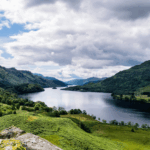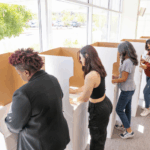After two years of planning and preparation, the fifth edition of our annual Walkshop series has come to a close and we are still catching our breath. From 26 June to 1 July, an incredibly international and motivated group of 13 participants set out on foot to explore the pressing issues of nuclear weapons, long-term peace, conflict prevention and intergenerational justice. This year’s Walkshop unfolded against the backdrop of Scotland’s scenic Loch Lomond and the Trossachs National Park, not far from the UK’s own nuclear submarine base. It combined hiking, discussion, learning stations, and a custom-designed audio curriculum to create an immersive and unforgettable learning experience.
Our route took us 63,5km across five days: from the starting point of the West Highland Way in Milngavie, through Drymen and Balloch, to the coastal town of Helensburgh and back to Glasgow. Along the way, participants reflected on the history and ethics of nuclear deterrence, the challenges of disarmament, and the environmental and human legacies of nuclear testing. Each day was framed by a specific topic, explored through audio lessons and group discussions. Our learning did not end with the hike and was carried forward into our three public evening webinars, which featured expert guests from policy, academia, and activism. The themes ranged from the dangers of nuclear proliferation in an increasingly nationalistic world, to the intergenerational implications of nuclear risks, and finally to the complex relationship between Scotland and the UK’s nuclear infrastructure. The three evening webinars are now available to watch on our YouTube channel, and we warmly invite everyone who missed the live events to tune in. The panels featured experts from organisations including ICAN, FAS, Carnegie China, UNIDIR, the Global Catastrophic Risk Institute, and the University of Nottingham, York, and Sciences Po, and were moderated by Walkshop organisers themselves.
Additionally, on Day 4, the group visited the legendary Faslane Peace Camp, located just opposite HMNB Clyde, the home port of the UK’s Trident submarines. There, long-standing peace activists shared their lived experience of protest, anti-nuclear organising, and life at the gates of a military base. On Day 5, we made our way to the Glasgow Women’s Library, where we were welcomed by Dr Catherine Eschle (University of Strathclyde), as well as curators Jenny Noble and Dr Caroline Gausden. Through a guided tour of the For Peace! Exhibition, we learned about the male-female dimensions of protest, the history of the Greenham Common Women’s Peace Camp, and the ways in which nuclear testing has disproportionately impacted Pacific Island communities, which is an issue increasingly described as ‘nuclear colonialism.’ These moments added emotional depth and historical context to the themes explored throughout the week and left a strong impression on the group.
The Walkshop brought together people from 9 countries and a wide range of disciplines: international law, peace and conflict studies, international relations, disarmament, history, and political activism. What united them was a commitment to intergenerational justice and a willingness to listen, learn, and engage deeply with complex, and at times heavy, subject matter, even while hiking through mud and midges.
Check out our YouTube videos documenting the 2025 Walkshop! The final videos bring together impressions from the daily hikes, our audio learning blocks, group conversations, all three public discussion evenings with international experts, and the learning stations we visited along the way. Watch the shorter version here! In a longer version of the video, which is also available on YouTube, you can hear directly from participants about the reflections they took away from this unique experience. Additionally, the longer version includes sneak peeks of each discussion evening. We hope the video gives you a sense of the journey, the conversations, and the ideas that made this year’s Walkshop so special.
This Walkshop would not have been possible without our dedicated team, our partner organisations, and, most of all, our brilliant participants. Your curiosity, reflections, laughter, and open-mindedness carried this project through every kilometre.
We also extend our heartfelt thanks to the Apple Tree Foundation, whose generous support made this year’s Walkshop possible.
Looking ahead, we are already dreaming up the next Walkshop and can not wait to continue this journey: on foot, in thought, and across generations.




